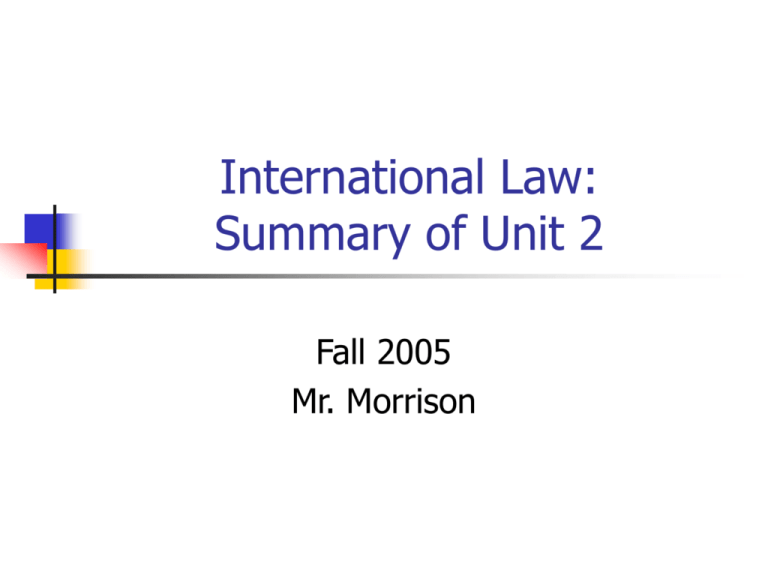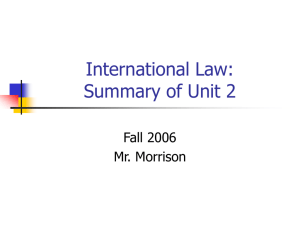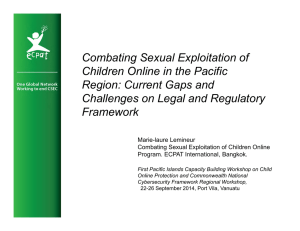Powerpoint
advertisement

International Law: Summary of Unit 2 Fall 2005 Mr. Morrison States and their formation Qualities of Statehood Fall 2005 Territory Population Government Independence/Ability to Conduct Foreign Relations Also, possibly, willingness to observe international law and human rights International Law: Unit 2 2 Types of jurisdiction To Prescribe (to make rules or laws) To Enforce (to carry out rules or laws) To Adjudicate (to decide cases) Note that the “prescriptive jurisdiction” about which we are talking is different from “judicial jurisdiction” of courts Fall 2005 International Law: Unit 2 3 Prescriptive Jurisdiction of States Traditional bases Fall 2005 Territorial Nationality Protective (limited to “important State interests—counterfeiting, fraud, etc.) Universal International Law: Unit 2 4 Additional jurisdictional issues “Active/passive” (or the “effects doctrine”) expands jurisdiction to cover acts that affect the territory or citizens of a country Many Civil Law countries legislate to cover acts of their citizens everywhere Fall 2005 International Law: Unit 2 5 Conflicts of jurisdiction Situations can arise in which 2 or more countries claim jurisdiction over same conduct Each can exercise jurisdiction, the issue is how to reconcile this Fall 2005 International Law: Unit 2 6 Conflicts of Jurisdiction Restatement of Foreign Relations Law of the US, 3rd, sec. 403 calls for a rule of reasonableness In exercising jurisdiction In deferring to the other State if it has a stronger interest But—conflicts can still occur This view is broadly accepted elsewhere Fall 2005 International Law: Unit 2 7 Jurisdiction to enforce Largely territorial Alvarez Machain or Ker v. Illinois Fall 2005 US courts do not test in criminal trial the international legality of seizure of criminal defendant abroad But there may be diplomatic or other consequences International Law: Unit 2 8 A Digression: Extradition, Deportation, Exclusion Extradition—removal of person to face charges abroad Deportation—removal of an alien from the State Exclusion—denial of entry to an alien Fall 2005 International Law: Unit 2 9 Extradition Extradition treaties Usually enumerate or describe offenses covered; other offenses are not covered Political offenses exception Rule of speciality—trial only for offense charged in extradition papers Under US law there must be a treaty or statute to support the extradition Fall 2005 International Law: Unit 2 10 Extradition (limits) Many Civil Law countries will not extradite their own citizens, but will try them at home for the offense abroad Many European (and some other) countries will not extradite if capital punishment is possible Fall 2005 International Law: Unit 2 11 Jurisdiction to adjudicate See the Conflicts of Laws course Fall 2005 International Law: Unit 2 12 State responsibility A State that violates international law incurs State Responsibility Consequences Fall 2005 It must cease its breach Other States may take countermeasures It may pay reparations International Law: Unit 2 13 State responsibility International Law Commission adopted Draft Rules on State Responsibility in 2001 UN General Assembly accepted its report, but did not call diplomatic conference to write a treaty Status of draft rules? Fall 2005 International Law: Unit 2 14





